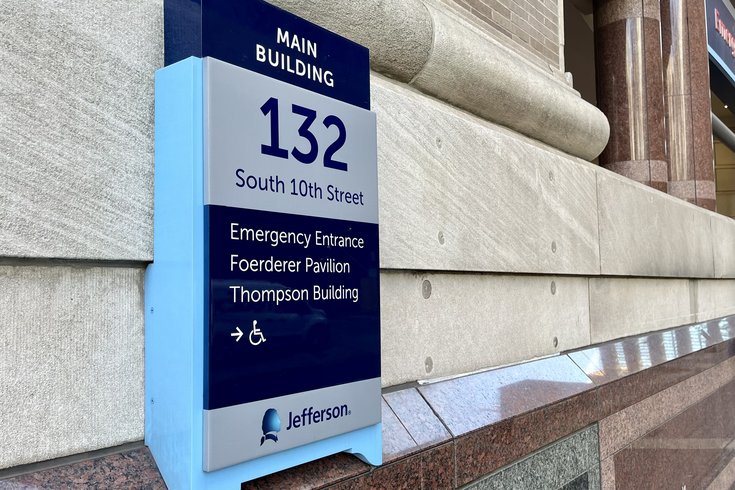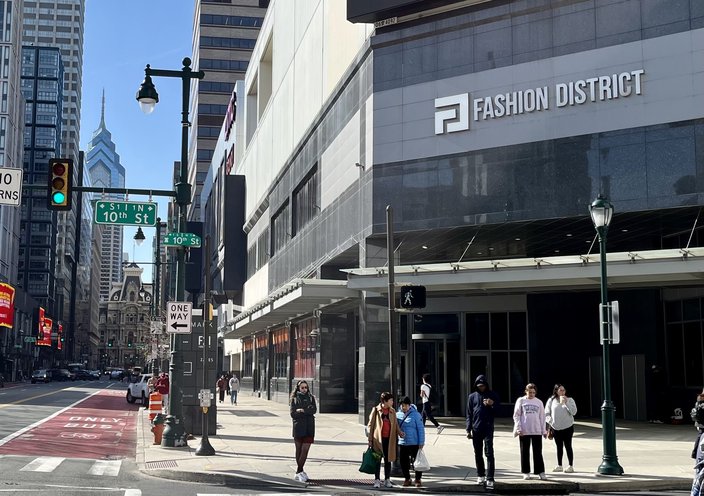
March 15, 2024
 Jon Tuleya/PhillyVoice
Jon Tuleya/PhillyVoice
Thomas Jefferson University Hospital houses one of Philadelphia's four adult Level 1 trauma centers. It is the only emergency center of its kind in Center City, sparking concern over traffic impediments to ambulances. The proposed 76ers arena, which be located blocks away, can hold up to 18,000 people.
For over a year, opponents of the proposed 76ers arena at 10th and Market streets have voiced concerns over the potential displacement of Chinatown residents and businesses, and the lost tax revenue that could come with it. Now, some are calling attention to an issue they say has been overlooked: the impact on emergency medical services.
If built, the new basketball arena would sit roughly two blocks away from Thomas Jefferson University Hospital and its Level 1 adult trauma center. Level 1 trauma centers receive the most critical cases, providing total and advanced care for every aspect of injury. Since the shuttering of Hahnemann University Hospital in 2019, Jefferson is the only trauma center of its kind in Center City — and some Philadelphia activists believe arena traffic would strain its already stretched resources.
"We're just thinking congested traffic ... how does that impede an ambulance?" said Will Benson, an organizer with No Arena Washington Square West. "I walk everywhere and I see that people are not moving out the way of those ambulances, they are struggling. This seems like this would magnify the point."
A spokesperson for 76 DevCo, the Sixers' development arm for the arena project, also known as 76 Devcorp, said the team "has been in constant conversation with Jefferson to understand their needs and ensure they are met by measures," including an emergency vehicle preemption system that would switch red traffic signals to green for approaching ambulances. The group said it has also changed its previous proposal to temporarily close 10th and 11th streets on game days. According to the latest Civic Design Review submission, only single lanes of 10th and 11th streets will be closed for one hour after games.
"There are many examples of measures like this working effectively in other markets," the 76 DevCo spokesperson said, "and we will continue to prioritize initiatives that allow first-responders to best serve our community."
Benson is not a medical professional, but he has been speaking with local doctors and nurses about these concerns, most recently at a No Arena Washington Square West meeting on Feb. 10. Benson led a discussion that day with a small group of health care workers "oscillating between anger and sadness," he said, over the potential impact on their patients.
The discussion turned to the medical theory of "golden hour," a concept popularized by the pioneering trauma surgeon R. Adams Crowley. Crowley believed that "the first hour after injury will largely determine a critically injured person's chances for survival," and while some argue the idea is more a guiding principle than scientific fact, time is crucial in cases of serious injury or cardiac events. A person's odds of surviving a heart attack decrease by roughly 10% each subsequent minute they go without care, and massive hemorrhages from gunshot wounds or other injuries can kill in as little as five minutes.
An emergency medicine worker employed near the proposed 76ers arena site, who spoke on the condition of anonymity over fear of retaliation, pointed to medications like tissue plasminogen activators, or tPAs, that must be administered to a person within the first 4 1/2 hours of ischemic stroke symptoms.
"There's a time point where you are not allowed to do certain interventions because it's beyond the recommendation from the American Heart Association or American Stroke Association," the worker explained. "That will determine the whole life, after the fact, of this patient.
"Imagining the traffic ... it's kind of scary. They claim to bring a lot of jobs, money into the city. You always want to think about human life as well."
76 DevCo argues similar projects have found the appropriate balance. The team calls the Chase Center in San Francisco a "great example of a new arena successfully integrating with an existing Level 1 trauma center." The home of the Golden State Warriors, located blocks away from the UCSF Medical Center, also attracted criticism from medical professionals during its development. When it was completed in 2019, UCSF released a color-coded calendar and alert system to warn of traffic delays and advised patients experiencing emergencies en route to the hospital to call 911.
The city's long-gestating impact studies, which would analyze the proposed arena's potential effects on traffic, have not yet been released. But traffic congestion isn't the only concern. The emergency worker also worries about potential upticks in diversions — a mitigation strategy for crowded hospitals which directs ambulances to other facilities. Hospitals already have a heightened alert protocol for preparing for disasters like snowstorms or mass casualty events known as Code D. If the arena is built, the worker believes Jefferson will spend even more days with Code D in effect.
The proposed location of the 76ers new arena, at 10th and Market streets, is about .3 miles from Thomas Jefferson University Hospital.
No Arena Washington Square West, which formed in the fall, is skeptical of some of the arena developers' concessions. The sheer volume of fans traveling to the 18,000-seat arena, organizers say, would render the preemption system inadequate. The group says it has been circulating an anti-arena petition among EMS workers, which has garnered roughly 100 signatures. Organizers hope to eventually publish it without jeopardizing the jobs of its signatories.
In an emailed statement, Jefferson Health acknowledged its expanding business ties to the Market East business corridor, which 76 DevCo hopes to revitalize. The health system unveiled its new Honickman Center, a 19-story outpatient facility on 11th and Chestnut streets, on Wednesday ahead of its official April 15 opening. Access to its facilities, however, remains a concern.
"Jefferson alone cannot help Market East realize its full potential as a thriving corridor," the statement read. "It will take collaboration from the business community, the government, non profit organizations and public safety partners. Jefferson's students, employees, and patients depend on a safe, vibrant neighborhood to learn, work, and access health care.
"It is paramount that any redevelopment effort prioritize public safety, address concerns of local residents, and mitigate traffic considerations to ensure uncompromised access to healthcare facilities, including to the Level 1 Trauma Center at Thomas Jefferson University Hospital."This story has been updated with information from 76 DevCo's latest CDR submission.
Follow Kristin & PhillyVoice on Twitter: @kristin_hunt
| @thePhillyVoice
Like us on Facebook: PhillyVoice
Have a news tip? Let us know.
 Jon Tuleya/PhillyVoice
Jon Tuleya/PhillyVoice